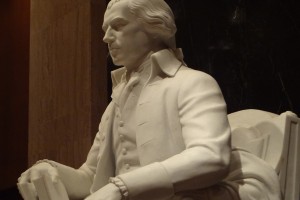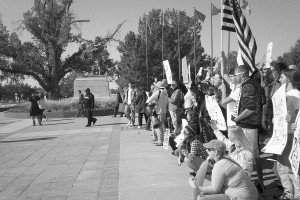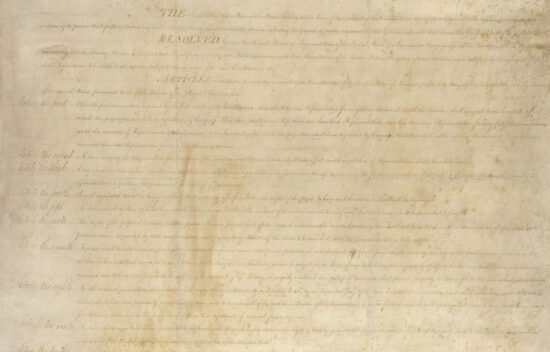Preserving the Bill of Rights
Want to create your own playlists, save resources to your library, and access answer keys? Sign up for an educator account!
10 Units
 Unit
UnitThe Bill of Rights and The Founders
Provides an introduction and overview of the Bill of Rights, including the Founders’ understanding of the “rights of Englishmen,” British law, and natural rights philosophy. This unit also examines the Federalist and Anti-Federalist debate about a bill of rights.
 Unit
UnitThe Bill of Rights and Religion
Explores the First Amendment’s Establishment Clause and Free Exercise Clause, including studies of the Founders’ understanding of both. The unit explores the constitutionality of government action relating to religion as well as the relationship between the government and religious institutions. The unit also investigates instances where “free exercise” and “establishment” might conflict.
 Unit
UnitThe Bill of Rights and Free Speech
Focuses on First Amendment protection of free speech, free assembly, and petition of government. The unit also examines the evolution of the definitions of protected expression in speech, petition, assembly, art, and demonstration.
 Unit
UnitThe Bill of Rights and Freedoms of the Press, Assembly, and Petition
First Amendment freedoms like press, assembly, and petition are essential to self-government. The Founders saw these freedoms as a bulwark of free, republican government and a means of assuring justice.
 Unit
UnitThe Bill of Rights and Property
Spotlights safeguards to property in the Bill of Rights, explores various types of property, and examines the concepts of takings, just compensation, and eminent domain.
 Unit
UnitThe Bill of Rights and Due Process
Covers search and seizure, rights of the accused, due process of law, jury trials, and protection from cruel and unusual punishment guaranteed in the Fourth, Fifth, Sixth, and Eighth Amendments.
 Unit
UnitThe Bill of Rights and Liberty
Explores the unenumerated rights reserved to the people with reference to the Ninth and Fourteenth Amendments, with a focus on rights including travel, political affiliation, and privacy. Probes the ways the Ninth and Fourteenth Amendments have been used to claim rights to personal liberty.
 Unit
UnitThe Bill of Rights and Federalism
Explores the powers reserved to the states as provided by the Tenth Amendment. Explains the Founders’ understanding of a federalist system and the expansion and contraction of the federal government’s power.
20 Lessons
 Lesson
LessonWhy A Bill of Rights? What Impact Does It Have?
The debate over the Bill of Rights at the Founding was not an argument over whether rights exist, but about how best to protect those rights. The Founders disagreed about whether a bill of rights was necessary, and whether it would be effective. Later generations continue to face the challenge of finding the best way to safeguard individual rights. This lesson explores these debates and discussions.
 Lesson
LessonWhat Are the Origins of the Bill of Rights?
How did the the events and philosophies from British and colonial history shape the Founders' ideas about natural rights as well as the rights of Englishmen? How do these rights affect our daily lives in a free society?
 Lesson
LessonThe Establishment Clause — How Separate Are Church and State?
The original thirteen states that formed the United States included individuals from a variety of religious traditions. To ensure that the national government respected freedom of belief, freedom of conscience, and freedom of religious practice, the First Amendment prohibited the federal government from either establishing a national church or interfering with existing state religions. Since then the Supreme Court has created various "tests" to determine if government practices violate the Establishment Clause of the First Amendment. This lesson explores the history and principles behind this clause.
 Lesson
LessonWhat Is the Significance of the Free Exercise Clause?
One of America's most cherished freedoms is the free exercise of religion. In a nation where people of many faiths live side-by-side, the First Amendment's Free Exercise Clause protects individuals from government interference in the practice of their faith. The government cannot target laws at specific religious practices or place undue burdens on its citizens' worship. This lesson explores the free exercise clause and the many questions that arise from its enforcement.
 Lesson
LessonWhy is Free Speech Essential to Self-Government?
America's Founders recognized the necessity of vigorous public debate and enshrined the right to speak freely in the Bill of Rights. This component of the Constitution protects a wide range of speech, including speech we might find disagreeable. While the First Amendment's primary purpose was to protect political speech, its protections do have limits. This lesson explores this essential principle of free speech.
 Lesson
LessonHow Has Speech Been Both Limited and Expanded, and How Does it Apply to You and Your School?
The Founders meant for the First Amendment to protect a wide array of expressive activities. The Supreme Court, recognizing changes in society and technology, has applied the First Amendment's protections in some ways that are broader than ever. Student speech in public schools, however, poses unique questions. This lesson will help students to understand the operation of the First Amendment in both their school and in the wider context of society, and it will help foster students' appreciation of their rights, preparing them for responsible and effective participation in their school, community, and nation.
 Lesson
LessonWhy Does a Free Press Matter?
How does a free press make self-government possible? Examine the history and importance of press freedom and encourage students to seek out information on constitutional issues from multiple sources.
 Lesson
LessonWhy Are the Rights to Assembly and Petition Important to Liberty?
The Founders knew that an individual's voice is at its most powerful when he can freely come together with citizens of like mind and speak as one. People in the United States have organized, demonstrated, petitioned, and protested in a variety of ways and on a variety of topics, many controversial, since our very beginnings. These rights, however, are not unlimited and must find balance with the rights and safety of others. This lesson explores this balance.












